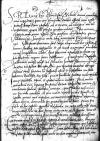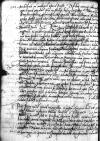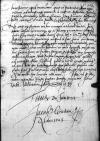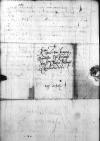Etsi ex litteris ⌊Alberti Cuon⌋ et aliorum animum consiliumque meum cognoscere posses, vir clarissime,
tamen officium meum esse putavi brevem hanc epistolam ad te mittere, ut memoriam mei tibi refricarem, quam tibi prorsus excidisse arbitror. Nec mirum supputo enim annos septem et eo amplius ab eo tempore, quo cum ⌊Valdesio⌋ ⌊caesaris⌋ secretario mihi tibique amicissimo proxime essemus una, ubi quasi divinans fore mihi aliquando hoc expetendum, honori studioque tuo inserviens, te ob tuam auctoritatem eruditionemque singularem colebam, quae plurimum apud me valuisse ex hoc maxime negotio potes existimare. Cum primum ⌊Augusta⌋ ⌊Vallisoletum⌋ venit, id est ad Calendas Iunias, Mercurio quodam dextro seu potius Deo Optimo Maximo, qui semitas hominum dirigit, inscius rerum sortitus sum hospitium apud dominam ⌊Isabellam⌋ matrem ⌊Ioannae Dantiscae⌋, tuae filiae, quam puellam quoties video (video autem quotidie saepius) te ipsum intueri videor. Quid multis memoria tui meumque perpetuum de tua singulari virtute et eruditione iudicium antiqua amicitia ipsaque ⌊puella⌋ miserabilis ac proinde amabilis et alia multa amore quodam honesto et sancto animum meum impulere, ut mea interesse putarem uxorem illam ducere, dummodo per gratiam tuam id fiat. Quam profecto ob hoc exspecto, quod mihi reddenda sit ratio vitae meae, tum magnatibus et viris non parvae auctoritatis in ⌊Hispania⌋, tum et matri consanguineisque meis honestissimis eisdemque ditissimis. Ceterum, quod scire fortasse cuperes de condicione ms. condictione(!)
⌈condicionecondicione ms. condictione(!)
⌉ mea, sum etiam nunc apud serenissimam ⌊Augustam⌋, eodem munere fungens, quo ⌊Valdesius⌋ noster olim apud ⌊caesarem⌋ fungebatur, sane honorifico, sed laborioso. Nam praeter multa, quae mihi in dies negotium facessunt, ver
 BCz 247, p. 282
tendis litteris non mediocrem operam praesto. Ab his muniis obeundis hidden by binding⌈[is]is hidden by binding⌉ quidquid otii datur fere in studiis litterarum consumo. Nec unquam adeo hidden by binding⌈[deo]deo hidden by binding⌉ sum occupatus, quin exercitii gratia duas lectiones fere singulis diebus uni aut alteri amico interpreter, alteram Latinam hidden by binding⌈[m]m hidden by binding⌉ ex orationibus ⌊Ciceronis⌋, alteram Graecam ex orationibus ⌊Isocratis⌋ aut hidden by binding⌈[aut]aut hidden by binding⌉ ⌊Demosthenis⌋. Reverendissimo domino ⌊cardinali Toletano⌋ sum familia hidden by binding⌈[ilia]ilia hidden by binding⌉rissimus, siquidem quotidie apud eundem duas aut tres horas insu hidden by binding⌈[su]su hidden by binding⌉mo, tum propter negotia publica, quae mihi pleraque cum eo sunt con hidden by binding⌈[con]con hidden by binding⌉ferenda, tum etiam propter litterulas meas, quibus ille vir gravis hidden by binding⌈[vis]vis hidden by binding⌉simus ad solatium et levamen molestorum negotiorum libenter utitur. Itaque auctorem aliquem probatum una legentes materiam colloquendi hidden by binding⌈[endi]endi hidden by binding⌉ Latine arripimus, quo in genere non nihil mihi tribuit. Delectatur hidden by binding⌈[ctatur]ctatur hidden by binding⌉ enim maxime sermone Latino, fortasse praesagiens iam nunc se ad ponti hidden by binding⌈[nti]nti hidden by binding⌉ficatus apicem venturum. Interdum iussu illius vel prosa, vel carmi hidden by binding⌈[mi]mi hidden by binding⌉ne aliqua condo, ne ille me existimet mercurium tantummodo in hidden by binding⌈[in]in hidden by binding⌉ lingua habere. Hoc genus est oratio funebris a me eodem die hidden by binding⌈[e]e hidden by binding⌉, quo princeps Taurinorum obiit, edita et pronuntiata, quam prop hidden by binding⌈[prop]prop hidden by binding⌉terea ad te misi, ut si velis ex ea veluti των ονυχων των λεοντα γιγνοσκειν, ut Graeco proverbio dicitur, periculum hidden by binding⌈[ulum]ulum hidden by binding⌉ eruditiunculae meae facias. Reliqua de me ab ipso ⌊Cuon⌋ et aliis accipies, quae fide mea spondeo futurum, ut omnia longe ampliora quam ab ipsis de me praedicantur invenias. Vale.
BCz 247, p. 282
tendis litteris non mediocrem operam praesto. Ab his muniis obeundis hidden by binding⌈[is]is hidden by binding⌉ quidquid otii datur fere in studiis litterarum consumo. Nec unquam adeo hidden by binding⌈[deo]deo hidden by binding⌉ sum occupatus, quin exercitii gratia duas lectiones fere singulis diebus uni aut alteri amico interpreter, alteram Latinam hidden by binding⌈[m]m hidden by binding⌉ ex orationibus ⌊Ciceronis⌋, alteram Graecam ex orationibus ⌊Isocratis⌋ aut hidden by binding⌈[aut]aut hidden by binding⌉ ⌊Demosthenis⌋. Reverendissimo domino ⌊cardinali Toletano⌋ sum familia hidden by binding⌈[ilia]ilia hidden by binding⌉rissimus, siquidem quotidie apud eundem duas aut tres horas insu hidden by binding⌈[su]su hidden by binding⌉mo, tum propter negotia publica, quae mihi pleraque cum eo sunt con hidden by binding⌈[con]con hidden by binding⌉ferenda, tum etiam propter litterulas meas, quibus ille vir gravis hidden by binding⌈[vis]vis hidden by binding⌉simus ad solatium et levamen molestorum negotiorum libenter utitur. Itaque auctorem aliquem probatum una legentes materiam colloquendi hidden by binding⌈[endi]endi hidden by binding⌉ Latine arripimus, quo in genere non nihil mihi tribuit. Delectatur hidden by binding⌈[ctatur]ctatur hidden by binding⌉ enim maxime sermone Latino, fortasse praesagiens iam nunc se ad ponti hidden by binding⌈[nti]nti hidden by binding⌉ficatus apicem venturum. Interdum iussu illius vel prosa, vel carmi hidden by binding⌈[mi]mi hidden by binding⌉ne aliqua condo, ne ille me existimet mercurium tantummodo in hidden by binding⌈[in]in hidden by binding⌉ lingua habere. Hoc genus est oratio funebris a me eodem die hidden by binding⌈[e]e hidden by binding⌉, quo princeps Taurinorum obiit, edita et pronuntiata, quam prop hidden by binding⌈[prop]prop hidden by binding⌉terea ad te misi, ut si velis ex ea veluti των ονυχων των λεοντα γιγνοσκειν, ut Graeco proverbio dicitur, periculum hidden by binding⌈[ulum]ulum hidden by binding⌉ eruditiunculae meae facias. Reliqua de me ab ipso ⌊Cuon⌋ et aliis accipies, quae fide mea spondeo futurum, ut omnia longe ampliora quam ab ipsis de me praedicantur invenias. Vale.
Paene praeterieram, quod maxime scriptum oportuit, hoc est matrem hidden by binding⌈[trem]trem hidden by binding⌉ atque filiam ignaras huius consilii a nobis initi. Et hoc am hidden by binding⌈[am]am hidden by binding⌉plius quam primum abs te prospici oportere puellae nimirum iam un hidden by binding⌈[n]n hidden by binding⌉decimum annum ingressae, ne pudicitia eius apud matrem non hidden by binding⌈[n]n hidden by binding⌉ satis spectatis moribus et cui nihil praeter praetium dulce est, peri hidden by binding⌈[i]i hidden by binding⌉clitetur. Nam interim, hoc est tantisper dum curia ⌊Augus hidden by binding⌈[us]us hidden by binding⌉tae⌋ hic agit et quoad responsum tuum accipiamus, educatur hidden by binding⌈[ur]ur hidden by binding⌉
 BCz 247, p. 283
honestissime apud ⌊matrem meam⌋, quae in praesentiarum hic agit rationem administrati muneris a marito defuncto quondam praefecto tormentorum belliorum ⌊caesaris⌋. Itaque praetextu hospitalitatis observatur a nobis ⌊puella⌋ et observabitur quam diu hic erimus.
BCz 247, p. 283
honestissime apud ⌊matrem meam⌋, quae in praesentiarum hic agit rationem administrati muneris a marito defuncto quondam praefecto tormentorum belliorum ⌊caesaris⌋. Itaque praetextu hospitalitatis observatur a nobis ⌊puella⌋ et observabitur quam diu hic erimus.
Ne autem existimares me hoc coniugium utilitate metiri, petii abs te in litteris Germanorum, ut si fortasse gravareris aliquid dotis filiae mittere, saltem dares operam, uti a ⌊serenissimo rege Poloniae⌋ stipendii nomine quotannis aliquid in hac curia acciperem nimirum negotia ab eodem rege mihi mandanda curaturus, cum nemo alius (absit verbo invidia) in aula ⌊Augustae⌋ melius me hoc facere possit, cum propter praxim et peritiam rerum longo usu mihi comparata<s>, tum propter linguarum cognitionem, quibus ad vos esset isthuc scribendum. Quod si hoc etiam grave videbitur, id quod tute ipse fatebere minus, cum pollicitis quilibet abundare possit, promittito mihi aliquid bona fide, ut aliis satisfaciam et
cf. Vulg. Lc 5:5 Praeceptor, per totam noctem laborantes nihil cepimus, in verbo autem tuo laxabo rete ⌊in verbo tuo laxabo rete meumcf. Vulg. Lc 5:5 Praeceptor, per totam noctem laborantes nihil cepimus, in verbo autem tuo laxabo rete ⌋. Haec ad te pluribus exemplis scripsi propter temporum iniquitatem.
 BCz 247, p. 282
tendis litteris non mediocrem operam praesto. Ab his muniis obeundis hidden by binding⌈[is]is hidden by binding⌉ quidquid otii datur fere in studiis litterarum consumo. Nec unquam adeo hidden by binding⌈[deo]deo hidden by binding⌉ sum occupatus, quin exercitii gratia duas lectiones fere singulis diebus uni aut alteri amico interpreter, alteram Latinam hidden by binding⌈[m]m hidden by binding⌉ ex orationibus
BCz 247, p. 282
tendis litteris non mediocrem operam praesto. Ab his muniis obeundis hidden by binding⌈[is]is hidden by binding⌉ quidquid otii datur fere in studiis litterarum consumo. Nec unquam adeo hidden by binding⌈[deo]deo hidden by binding⌉ sum occupatus, quin exercitii gratia duas lectiones fere singulis diebus uni aut alteri amico interpreter, alteram Latinam hidden by binding⌈[m]m hidden by binding⌉ ex orationibus  BCz 247, p. 283
honestissime apud
BCz 247, p. 283
honestissime apud 


